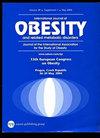ALDH1A1 特异性抑制剂 FSI-TN42 在饮食诱导的肥胖症小鼠模型中的减肥和代谢效应。
IF 4.2
2区 医学
Q1 ENDOCRINOLOGY & METABOLISM
引用次数: 0
摘要
背景:视黄酸(RA)参与体重调节和能量代谢。ALDH1A1是负责RA生物合成的主要酶之一,缺乏ALDH1A1的小鼠对饮食诱导的肥胖具有抵抗力。此前,我们发现 FSI-TN42 (N42) 是一种 ALDH1A1 特异性抑制剂,并报告了它的药代动力学、药效学及其抑制体重的功效:在第一项研究中,给 C57BL/6 J 雄性小鼠喂食高脂肪饮食 8 周以诱发肥胖。然后将小鼠分为三组,分别喂食(1)中等脂肪饮食(MFD)、(2)MFD + WIN 18,446 (1 克/千克饮食)或(3)MFD + N42 (1 克/千克饮食)8 周。对照组小鼠在整个期间均食用低脂食物。每周称一次小鼠体重,每 4 周测定一次空腹血糖。通过组织病理学和全血细胞计数检查组织的潜在毒性。在第二项研究中,我们通过测定肥胖症小鼠的食物摄入量、活动量和能量消耗来检测 N42 对能量平衡和/或食欲的影响。最后,我们通过交配研究测试了生育能力:结果:与单独使用 MFD 相比,N42 通过减少脂肪含量而不减少瘦肉含量,明显加快了肥胖小鼠的体重减轻速度。N42 不会改变食物摄入量或活动水平。虽然使用 N42 治疗的小鼠体重明显减轻,但与仅喂食 MFD 的小鼠相比,它们保持了相似的能量消耗水平。喂食N42的小鼠在餐后会优先消耗脂肪,尤其是在中温或轻度寒冷条件下。N42不会影响雄性小鼠的生育能力:结论:在饮食诱导肥胖的小鼠中,N42与MFD一起使用可促进体重减轻,但不会导致明显的器官毒性或雄性不育。未来的研究将确定,如果将 N42 与现有的减肥药物结合使用,是否能进一步促进减肥。本文章由计算机程序翻译,如有差异,请以英文原文为准。

Weight loss and metabolic effects of an ALDH1A1-specific inhibitor, FSI-TN42, in a diet induced mouse model of obesity
Retinoic acid (RA) participates in weight regulation and energy metabolism. Mice lacking ALDH1A1, one of the major enzymes responsible for RA biosynthesis, are resistant to diet-induced obesity. Previously, we identified FSI-TN42 (N42) as an ALDH1A1-specific inhibitor and reported its pharmacokinetics and pharmacodynamics as well as its efficacy in weight suppression. In the first study, C57BL/6 J male mice were fed a high fat diet for 8 weeks to induce obesity. Mice were then divided into three groups and fed (1) moderate fat diet (MFD), (2) MFD + WIN 18,446 (1 g/kg diet), or (3) MFD + N42 (1 g/kg diet) for 8 weeks. A control group of mice were fed a low-fat diet for the entire period. Mice were weighed weekly and fasting glucose was determined every 4 weeks. Tissues were examined for potential toxicity using histopathology and complete blood counts. In the second study, we examined influences of N42 on energy balance and/or appetite by determining food intake, activity and energy expenditure in mice with obesity treated with MFD or MFD + N42. Lastly, we tested fertility with a mating study. N42 significantly accelerated weight loss compared to MFD alone in mice with obesity by reducing fat mass without decreasing lean mass. N42 did not alter food intake or activity levels. While mice treated with N42 lost significantly more weight, they maintained a similar level of energy expenditure compared to mice fed MFD only. Mice fed N42 preferentially used fat postprandially, especially under thermoneutral or mild cold challenge. N42 did not affect male fertility. N42 promotes weight loss when used with MFD in mice with diet-induced obesity without causing significant organ toxicity or male infertility. Future studies will determine if N42 can be used to promote further weight loss if combined with current weight loss drugs.
求助全文
通过发布文献求助,成功后即可免费获取论文全文。
去求助
来源期刊

International Journal of Obesity
医学-内分泌学与代谢
CiteScore
10.00
自引率
2.00%
发文量
221
审稿时长
3 months
期刊介绍:
The International Journal of Obesity is a multi-disciplinary forum for research describing basic, clinical and applied studies in biochemistry, physiology, genetics and nutrition, molecular, metabolic, psychological and epidemiological aspects of obesity and related disorders.
We publish a range of content types including original research articles, technical reports, reviews, correspondence and brief communications that elaborate on significant advances in the field and cover topical issues.
 求助内容:
求助内容: 应助结果提醒方式:
应助结果提醒方式:


